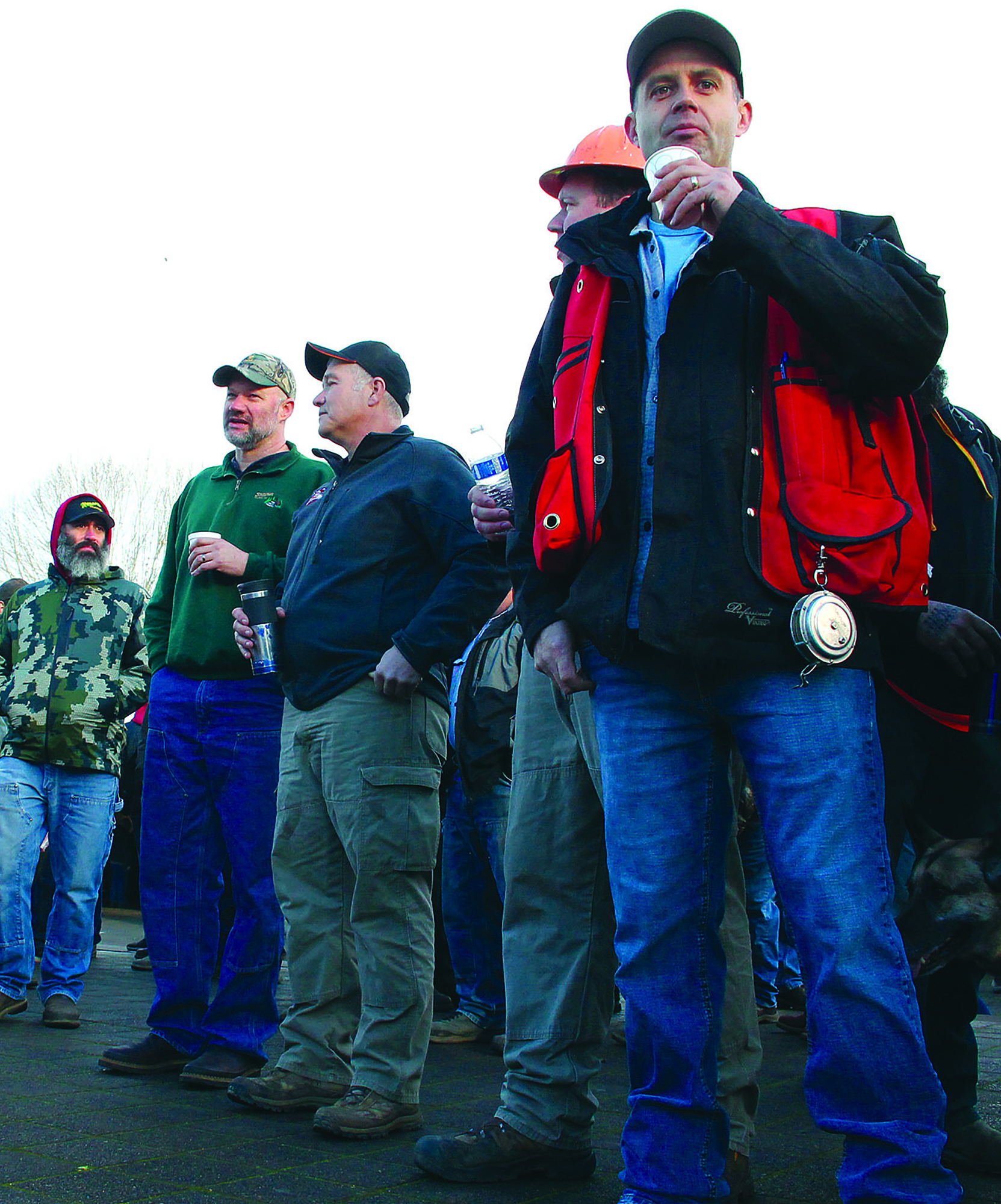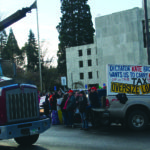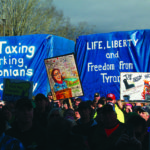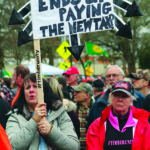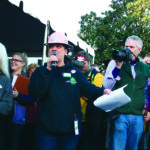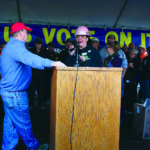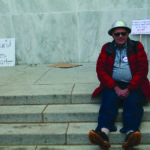By Sarah Brown
Lebanon Local
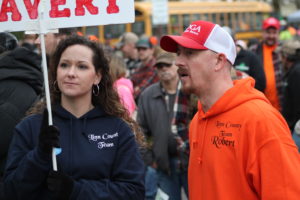
Ten local truckers and their rigs left Lebanon early on the morning of Thursday, Feb. 6, and united with about 1,100 others to join a statewide #TimberUnity convoy at the capital in protest of proposed Senate Bill 1530, known colloquially as the “cap-and-trade” bill, and its sister bills.
Most truckers parked at the state fairgrounds and other locations, and participants in the rally organized by TimberUnity were shuttled to the Capitol building. Many others spent the day driving through downtown Salem and blowing their horns around the Capitol building.
A crowd estimated at more than 9,500 people rallied in front of the Capitol with signs, and listened to workers, leaders and politicians speak out against the bill.
“You always get nervous because you don’t know how many people are going to show up, and then when they all come together, it’s like, ‘Wow!’ It’s fantastic,” said Angelita Sanchez, a Lebanon trucking company owner and board member of Timber Unity.
The stated purpose of the bill, numbering 86 pages plus multiple amendments, is said to be for the purpose of reducing greenhouse gas emissions due to climate change by gradually reducing the allowed amount of gas emitted by manufacturing, transportation and utility entities.
In other words, it’s a “pay to pollute” system, Sanchez said, noting that any cost increases those gas-emitting companies have to pay will simply be passed on to consumers.
Concerns raised by Timber Unity supporters include the requirement to upgrade trucks and equipment to meet emission control standards.
If the bill passes, Byron Wilson of Lebanon says it will put him out of business. He owns his own hauling truck.
“My truck doesn’t meet what (Gov. Kate Brown) is trying to pass,” he said. “It’s $10,000 to have the (upgraded) system put on, and that’s if the truck can accept it. You can either do that, or buy a new one. I just looked at a new one and it was $160,000 just the cab and chassis, no equipment.”

Even farmers and loggers are at risk of shutting their businesses down for the same reason, Wilson said.
Sanchez said that verbiage in last year’s HB2020 indicated Oregon’s timber industry is basically dead, and when she attended the first convoy in 2019, Senate President Peter Courtney stood on the Capitol steps and said, ‘I don’t know what to tell you. Your rural way of life is over. You’re just going to have to move to town and get a green job.’
But Timber Unity concerns go beyond the logging industry, supporters say. The cap-and-trade bill affects farmers and agriculture, commercial fishermen, miners, the transportation industry, and every citizen in Oregon.
Jeff Leavy, founder of Timber Unity, said he read SB1530 and worked out the math, noting that fuel costs would go up more than 75 cents per gallon, and increase several dollars over the course of the program, he said.
The bill was modified to take rural areas of the state into consideration in order to lessen the impact on financially-burdened families, but Leavy doesn’t believe it will make a difference at all.
“If you look at the numbers and what it will do to every single person in this state, it will go up anywhere from $600 the first year to $1,100 for a family of four,” he said. “Your fuel prices are gonna jump 78 cents the first year, and they do nothing but go up. By 2050, you’re looking at close to $10 a gallon.”
SB1530 limits and gradually reduces the amount of carbon that gas-emitting companies can expend, but they can pay for carbon credits to emit more. However, anyone is able to buy the credits outside of public record, including companies in California, and can re-sell them.
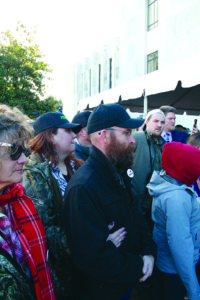
Leavy believes California will buy up the credits and try to re-sell them at blown up prices. If the smaller industries in Oregon, such as Georgia Pacific, can’t afford to make their products under the new emissions standards, and can’t buy the inflated credits, they will simply close their business, he said.
The proposed bill also includes provisions for keeping some information confidential, exempt from disclosure to the Legislative Assembly, media and public. This is so that “the Oregon Greenhouse Gas Initiative operate free of abuse and disruptive activity,” sponsors say.
But public records advocates worry that it will create a slippery slope leading to excessive secrecy.
And finally, attached to the bill is an emergency clause, making the law and its requirements effective immediately.
Timber Unity is opposed to the bill being fitted with an emergency clause and being pushed during the 35-day short session. They believe it should be up to the voters.
“(Democratic State Sen.) Ginny Burdick came out on record and said this bill is too complex for the voters to be able to determine, so that’s why they need the emergency clause, and basically she’s saying the voters are too stupid,” Leavy said. “We want it removed, and we want it put to the vote, because I can tell you this, it will fail and they know it, and that’s why they’re doing it this way.”
Rep. Shelly Boshart Davis, R-Albany, agrees the bill is not suitable for short session work.
“For this bill to not even be ready that first week of short session is just proof that it’s not a short session issue,” Boshart Davis said. “It absolutely should be taken up in the long session, and people working on it from now until then.”
If the bill passes, Leavy predicted, every Oregonian will feel its effect.
“Rural Oregon’s gonna pay for it just like Portland will in about three or four years after this is initiated,” he said. “It really affects not just rural, it affects urban, it affects everybody. Everybody is gonna pay.”
That’s because any increased cost to a business will be passed on to the consumer, opponents say.
“I’m surprised that nobody else in the state really understands it’s going to affect everyone, not just us,” said Rodney Miles, a trucker from Albany. “Everything’s gonna go up. It’s just like anything else; if minimum wage goes up, the price of a gallon of milk goes up. We’ve got to cover the cost somewhere.”
During the rally on Feb. 6, Timber Unity submitted a five-page proposal to legislative leaders aimed at meeting goals for carbon reduction.
“We presented a question to (Gov. Kate Brown) and to the committee: ‘Is this really about sequestering carbon, or is this really about raising revenue?’ Gov. Brown did say this is about sequestering carbon, but (Senate Environment and Natural Resources Committee) Chair (Sen. Michael) Dembrow did not respond,” Sanchez said.
“We submitted four suggestions to meet their goals and standards that would cost taxpayers zero dollars. So if it’s to be working on carbon emissions, we’ll talk about it. But if it’s to cost any more money, we’re totally against it,” she said.
Their four suggestions include: installing high-carbon sequestering plants along public roadways; taking into consideration that goods and services purchased out-of-state by the state costs more in terms of carbon emissions; building better recycling infrastructures within the state instead of hauling materials out-of-state; and enacting an accelerated depreciation program for facility and fleet upgrades to help business owners recoup investment costs.

Those who journeyed to the capital admitted they had to lose a day’s wage to be there, not to mention also the costs to drive and stay in Salem for the rally.
The day following the rally, Sanchez said she was told the legislature was “internally conflicted,” and there was hope they would scrap the bill.
A week later, an estimated 1,000 climate activists rallied at the Capitol in support of SB1530, holding signs urging to “make polluters pay.”
“Every single person in this state should be paying attention,” Leavy said, “because whether they realize it or not, they’re gonna have to pay for it, and it’s absolutely gonna do nothing to cure the climate crisis.”





